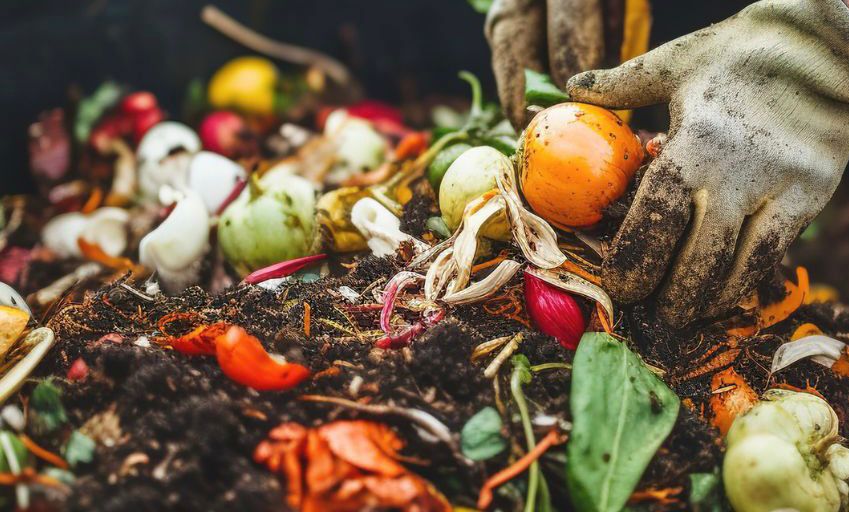By Gideon Amuah | Email – gideon.amuah@gmail.com
Every morning, Ghana’s bustling urban markets spring to life. Trucks arrive from the hinterlands loaded with tomatoes from Navrongo, plantains from Akyem, and yams from Techiman. Hawkers shout, traders’ bargain, and customers move through narrow aisles stacked with food. By evening, the same markets tell a different story—heaps of unsold, spoiling food tossed into drains and piles of refuse. Amid this daily spectacle of abundance and decay lies one of Ghana’s most overlooked threats to food security: food waste.
It is estimated that Ghana loses between 30 and 50 percent of the food it produces before it ever reaches the consumer. While much of this loss occurs on farms or during transport, the tragedy continues—and often worsens—in urban markets. Tomatoes rot under the sun, fruits bruise from rough handling, and vegetables wilt in humid stalls without refrigeration. Yet, even as we waste, millions of Ghanaians struggle to afford nutritious meals. Food waste in Ghana’s markets is a paradox that mocks both farmers’ labor and families’ hunger.
The causes are both structural and behavioral. Many markets lack proper infrastructure for storage or preservation. Traders often display food openly under the scorching sun or on bare ground, where it spoils quickly. Limited access to cold storage means perishable goods like tomatoes, lettuce, and mangoes last only a few days. Poor roads and long transportation times add to the problem—by the time produce reaches Accra or Kumasi, a portion is already spoiled.
The problem is not only physical, it is also systemic. Because prices fluctuate wildly, traders sometimes over-purchase when prices are low, only to lose stock when demand falls. Markets operate without reliable data or coordination, so supply frequently overshoots demand. Municipal authorities, too, lack the systems to collect, preserve, or repurpose unsold food. At the end of the day, what cannot be sold is dumped, often mixed with plastic waste and clogging drains, double blow to both food security and sanitation.
The impact on Ghana’s food security is enormous. Every ton of wasted food represents not only lost income for farmers and traders but also lost energy, fuel, water, and labor. The financial losses run into hundreds of millions of cedis annually. Worse still, this waste contributes to higher food prices. When traders lose part of their inventory, they raise prices to compensate, and the cost falls on consumers. The poor pay the highest price for inefficiency.
Yet this hidden crisis can be turned into opportunity. Across the world, cities are using food recovery and redistribution systems to fight hunger and waste simultaneously. Ghana can do the same. Unsold but safe food from markets could be redirected to school feeding programs, orphanages, or low-income communities through structured partnerships. Cold-chain hubs, powered by renewable energy, could be established in major markets to preserve perishable goods for longer periods. The Ministry of Agriculture and local assemblies can collaborate with private investors to introduce solar-powered cold storage units and refrigerated trucks at strategic points in the food supply chain.
Technology can help, too. Mobile apps that connect farmers and traders directly to urban consumers can reduce middle-layer delays that often cause gluts and spoilage. Real-time pricing and supply data would allow better coordination and prevent oversupply in certain markets. At the policy level, tax incentives could encourage food processors to collect surplus produce and convert it into paste, flour, or animal feed instead of letting it rot.
Perhaps the most urgent step, however, is a national behavioral shift. As a society, we must stop seeing food waste as normal. Market associations, consumers, and municipal authorities all have roles to play. Traders can be trained on better handling and preservation techniques. Shoppers can plan purchases more carefully to avoid overbuying. Municipal waste systems can separate organic waste for composting, turning today’s rot into tomorrow’s fertilizer.
Food waste is not just a moral failure—it is an economic and social one. In a country still battling high food inflation and malnutrition, throwing away food is equivalent to throwing away national progress. If Ghana can reduce its food waste by even 20 percent, millions more could eat, farmers could earn more, and markets could operate more efficiently.
The story of Ghana’s food security will not only be written in the fields of the farmer but also in the stalls of our markets. The food we save today could feed the hungry tomorrow. Reducing waste is not just an act of efficiency, it is an act of national responsibility.


